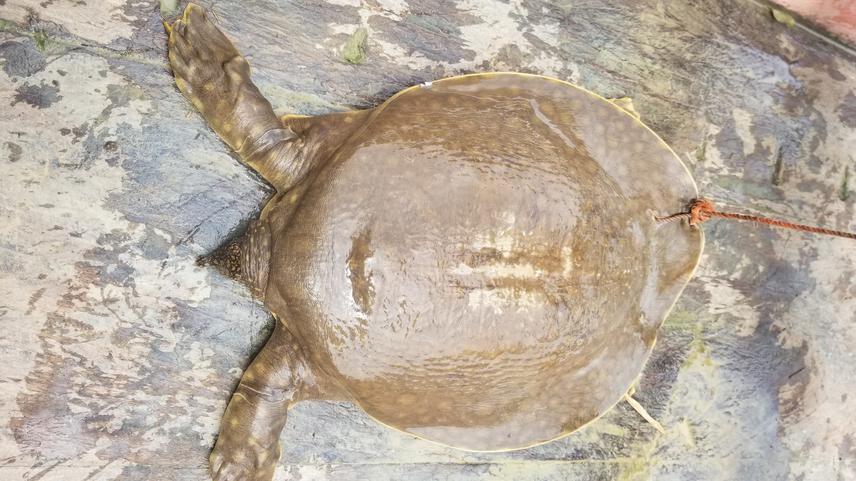Elvis Bawah
The family Trionychidae (softshell turtles) is a globally threatened taxonomic group with its species’ trade under both global and local restrictions. The species that occur in Ghana are the Nubian Flapshell Turtle (Cyclanorbis elegans), Senegal Flapshell Turtle (Cyclanorbis senegalensis) and African softshell turtle (Trionyx triunguis). According to IUCN (2021), Cyclanorbis elegans is enlisted as Endangered with a significant disappearance from its major river systems, while Cyclanorbis senegalensis and Trionyx triunguis are enlisted as Vulnerable with steep declines across much of their range in West Africa. All of these species are listed on Appendix II of CITES and have population reductions of >80%, >30%, and > 50% respectively (IUCN, 2021). Their declines are due to unrestricted exploitation for local consumption, traditional medicine, and pet trade. Furthermore, intensive agricultural irrigation practices, riverine forest fragmentation, and destruction of river systems have led to localized extinction crises of remnant populations. Worst, there is little scientific data on the species population, ecology, trade, and conservation status to inform stakeholders on the management and conservation of the species in Ghana. Therefore, this project seeks to provide information on ecological status of the species and raise awareness among fringed communities of the species habitat to increase support for its conservation.

The project is designed to determine current population, distribution, and threats to Cyclanorbis elegans, Cyclanorbis senegalensis, and Trionyx triunguis within the Ofin River and its catchments. The habitats of the species will be identified, assessed, and delineate as conservation hotspots. The project will raise awareness on species’ plight and solicit responsible participation of local community members towards the species conservation. Finally, stakeholders will be trained in turtle conservation and policy implementation. Moreover, the project has the potential to provide data on hard-shelled pelusios/pelomedusa species, which occur within the study area. This data will update their population and distribution status and help to facilitate conservation efforts towards these species.
The study will be conducted on the Ofin River, in the Atwima Mponua District of Ashanti, Ghana. The district lies within longitude 20 00‟W and 20 32‟W and latitude 60 32‟N and 60 75‟N and covers a land area of 1883.2 km2 (Hall and Swaine, 1976).
The project will provide novel data on the population, distribution, and ecology of the species for conservation management purposes. Data from the surveys will aid the development of the conservation action plan and delineation of conservation hotspots for the species. The conservation hotspots will serve as monitoring zones for further ecological and population assessments. The awareness education will increase knowledge on the species conservation status among community members. Acquired knowledge will create a positive behaviour change towards the species conservation and reduce unregulated exploitation and destruction of the species habitat. Awareness creation will also increase responsible participatory efforts and stakeholder collaborations to conserve the species. At the end of the project, data accrued will used to develop a draft for a Terrapin Conservation Action Plan (TCAP) under the legal authority of the Ghana Wildlife Division. The TCAP will be submitted to a review committee of the Ghana Wildlife Division for authentication and approval. Upon approval, the TCAP will be used to monitor species populations, restrict their exploitation, and reduce detrimental modification of their habitats within the project’s site.